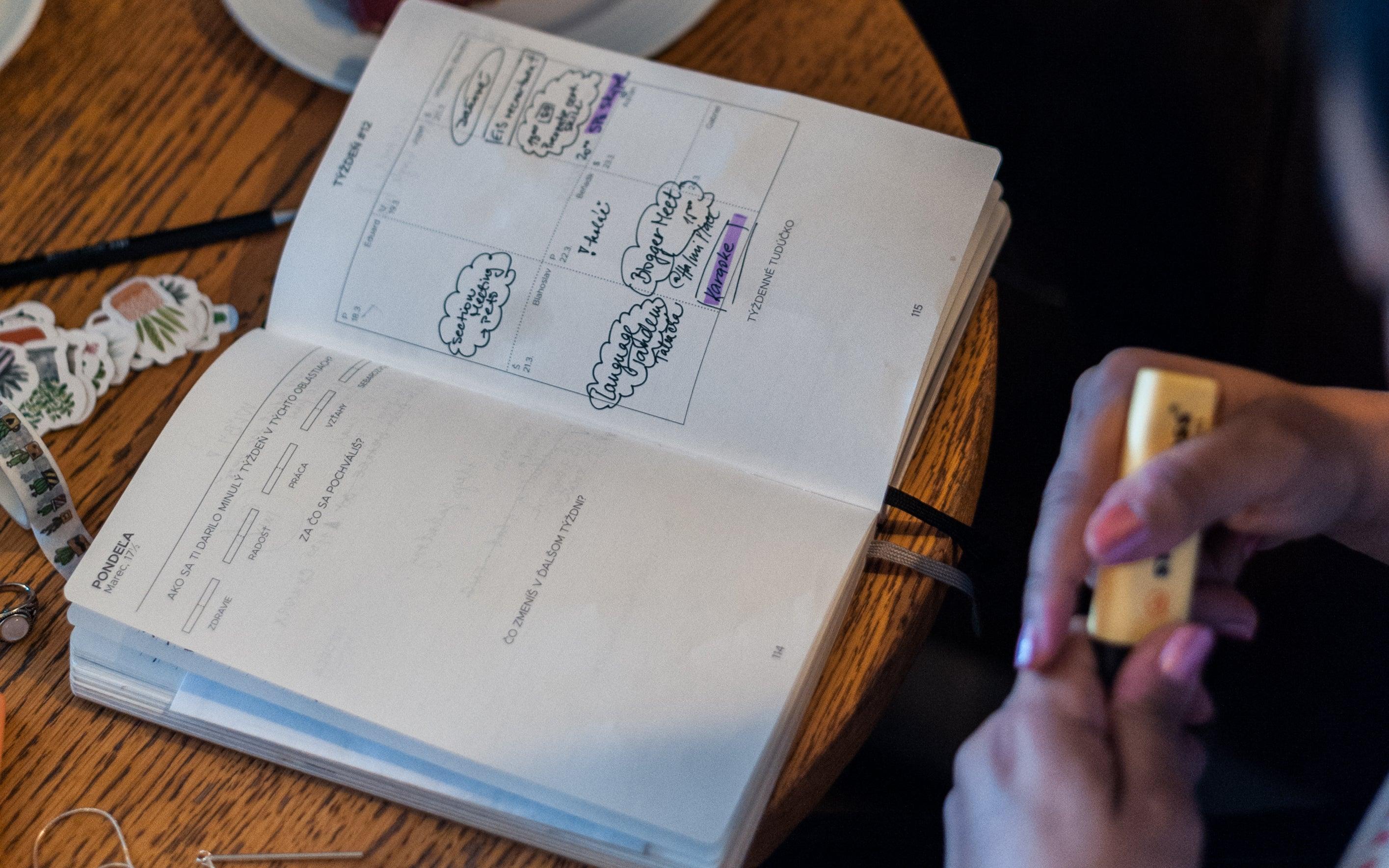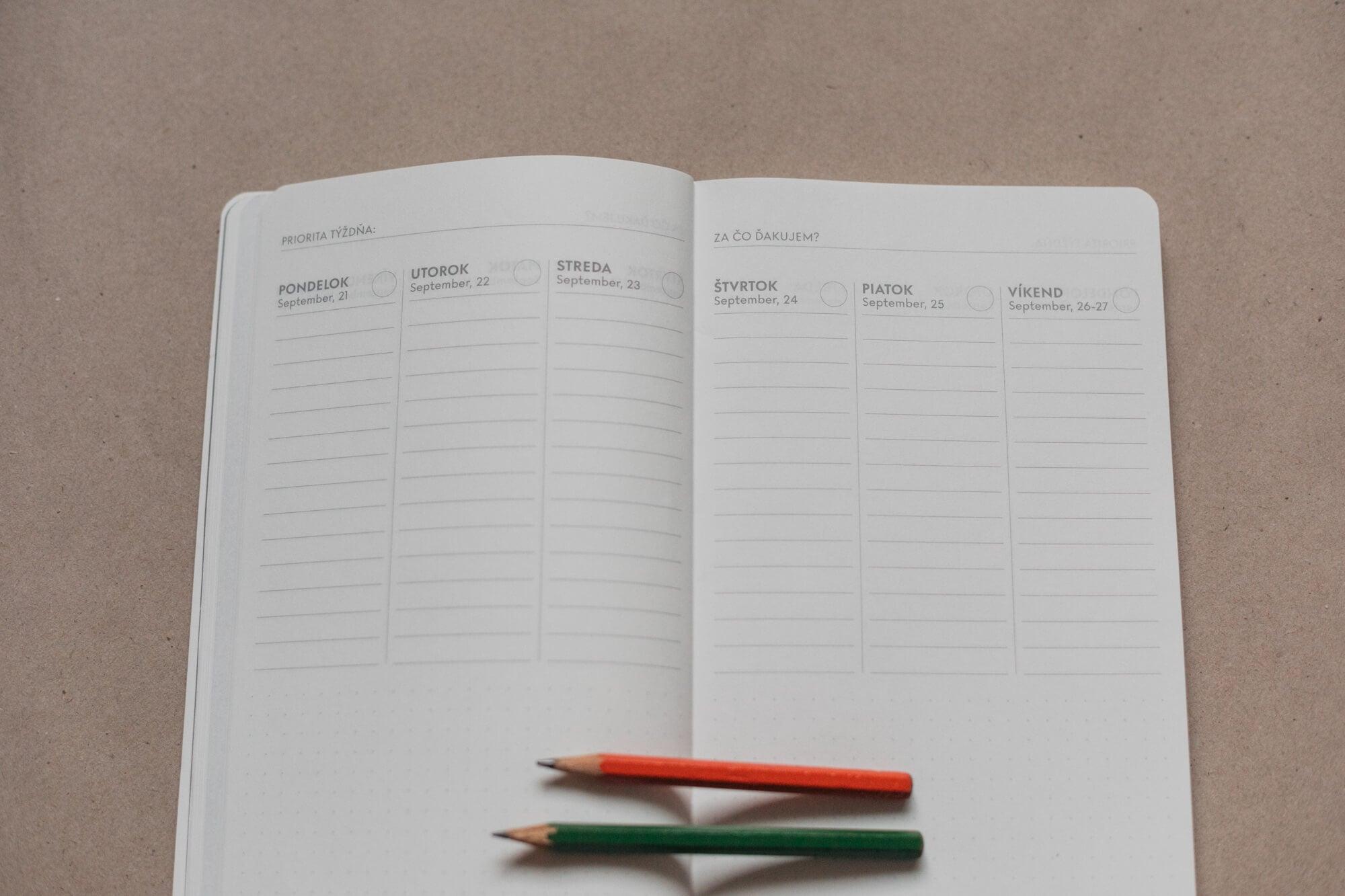
#101: Bullet Journaling
Bullet journal is a very simple system. It works on the principle of bullets - these can be tasks, meetings, reminders, ideas or a shopping list.
It doesn't have exact rules, you don't have to strictly stick to a format. Can you fill in 3 lines? All right. Do you need a whole page for today? Alright.
It is a personal, customizable and transparent system that I determine myself . I don't mind having a meeting at 4 in the afternoon and then at 9 in the morning. Why? Because it happened in that order. Maybe in 4 I have a meeting with the boss that we arranged a month ago. And later someone suggests coffee at 9. In the meantime, I have my tasks. It's my organized chaos.
In this article, I will advise you on how you can use bullet journaling in your life. As an illustration, I'm using the principles you'll find in the Journal as well, but BuJo (bullet journaling) is something you're in control of. You can also use an empty notebook for this (but it will be a bit easier with the Journal, especially if you are just starting out with BuJo).

A month in advance
Meetings, deadlines, conferences, trips, exams and other activities that I know about a month in advance, I write them down as soon as I hear about them (!). In order not to forget about myself and some personal goals in addition to all this, I use the space for monthly planning.
I always summarize what the previous month brought me and write down what I would like to improve or experience in the coming one. Maybe I need to save a little, increase the number of trainings or really start reading books for nationals - I'll write it all down there.
If you have space for it in your diary, you can also write down the habits you want to build - yours routine – and check off every day you did it. It can be sports, reading, studying foreign languages, etc.
In practice, I always come back to this double page when I plan a week in advance (mostly on Sundays).

A week in advance
This is something I really missed in the beginning of the height. An overview of meetings, documents, events in the city that I want to go to... everything in one place and a weekly newsletter below .
Those are the things I need to tackle that week, though I'll probably break them down into smaller milestones. For example:
- study for a linguistics test
- prepare a presentation for the conference
- write a blog article
- plan a vacation
- and so on
In addition, every week I summarize how satisfied I am in the 6 main areas of life distinguished by the Journal and write down what I want to praise myself for, what I have achieved. Then I also determine what I want to improve.
Here is the space to include a monthly goal in real life – so that, for example, the savings didn't just stay somewhere in my head, but I actually turned it into a diary.
Thus, for example, on Monday I will set a reminder "Don't buy anything today" or on Wednesday I will set the task "Buy groceries for the weekend".
In practice, I return to this double page throughout the week.

A day in advance
Or even on the given day, if you have time in the morning. The bottom line remains that I classically fill out a daily overview in a diary. It includes:
- what do i have to do that day
- where will i go that day
- dates if I have any that day
- some smaller goal that relates to the month's bigger goal
I use really simple notation: a square for a task, a ball for an event or meeting, an exclamation mark for a reminder, and I highlight what's a priority with highlighters (light for morning and dark for afternoon things, if there are so many of them). What I fulfill, I will color (a square or a ball), a if I move something, I mark it with an arrow and immediately write it down for the next day . Moved tasks are automatically prioritized for the next day.
I'm not making a big tragedy out of moving. Sometimes I don't estimate the time or my own strength, it just means that it wasn't possible that day or that some other priority popped up. And speaking of priorities: clearly prioritize directly in the diary. Even if you have more than 3 tasks, highlight the 3 that you will do that day even if roast pigeons fall from the sky.
Sometimes I write down something bigger and find out that I actually have to take several steps to accomplish it, and maybe I won't accomplish all of them in one day. At that time, I will just divide the task directly on that side and through bullet points I will write down everything that will help me fulfill the main task. Example for illustration:
- Write a new blog post
- edit photos
- find 3 resources on the topic
- write the outline of the article
- prepare social posts
- finish the article and publish it
- share the article on FB and IG
I think it's very intuitive and I adapt it to how I feel that day. It is important to know what I have to do, what I want to do and what I have actually done.
I tend to end the day by writing down something I'm grateful for that day. Because gratitude is never enough.
So what all belongs in the diary (in my opinion)?
- meetings or appointments for the day
- events you want to go to (for example, that festival in 3 months or a theater performance that Facebook would otherwise remind you of just an hour before)
- tasks that you determine yourself
- reminders or quick thoughts or ideas (because otherwise you will forget the fact)
- what do you do first: prioritize directly in the diary
- a piece of gratitude
- evaluating how you are doing at regular intervals
- fitness, food, water, alcohol, medication and menstruation - everything that is good to be aware of when your doctor asks you

BuJo's advantage: Pages according to you
A big added value is if you create lists or tables on blank pages to keep track of things that matter to you. Some great ideas:
- Books I want to read / Movies I want to see
- Tracking habits
- Fitness goals
- Monitoring of absences for students (as well as grades from credits or transcripts)
- Tracking the menstrual cycle for women (if you're old school and don't want a mobile app)
But you can adapt these to yourself. It is important to use the Suitor and BuJo as your tool for a better life, you are not his slave. :)
Do you use or are you going to use bullet journaling? Send us your photos in the comments or on Instagram, we'll be happy to encourage the hero community with them.



